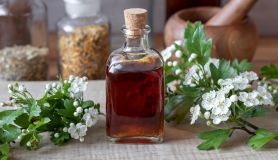Also thinking carefully about the kind of environment you want to create and the feelings and ambience you aim to surround yourself with is important in building a visual picture of your inner sanctum and strength. That’s where aromatherapy can be a real gift to a birthing woman. Essential oils not only smell good; they have the potential to tap into your emotions, heal and soothe your body, and promote spiritual connection.
Spend some time getting to know your oils before labour – how do particular oils make you feel? Everyone has a unique and individual relationship with their chosen oils. The essential oils you choose should really resonate for you: if an oil makes you feel nauseous or overwhelmed now, you can guarantee you won’t want it wafting around the room while you’re giving birth. Focus on creating the kind of space that feels right and supportive, taking into consideration the following qualities of the oil, but also connecting to how they make you –personally – feel.
Avoid using clary sage and jasmine during pregnancy as they promote uterine contractions, but certainly have a sniff and see what feels right for you. Make your blends up in dark, glass containers and have them ready for the big day – you don’t want to be rushing around making concoctions at the last minute!
Lavender lavandula officinalis – antispasmodic, antidepressant, sedative, relaxing, antiseptic, analgesic, uterotonic, hypotensive
Soothing and comforting in a massage blend, good to create ambient atmosphere for baby to enter. Lavender is also an antiseptic so useful to have on hand. Massaged into the skin in a carrier oil, it eases muscle aches. Try adding to water for a face spritzer that can be used to cleanse and cool the skin.
Clary Sage salvia sclarea – antispasmodic, uterotonic, dissipates anxiety, antidepressant, aphrodisiac, euphoric, hypotensive
Clary sage’s oestrogen like properties can accelerate a slow or dragging labour and can also be helpful in starting a late labour (consult an aromatherapist). Helpful as an analgesic in a compress – use with hot or cold flannels held over the painful area. Do not overuse, especially during the early stages, as it can slow labour in high doses and have a soporific effect on birth attendants! DO NOT USE AT THE SAME TIME AS PETHIDINE, EPIDURAL OR SYNTHETIC OXYTOCIN.
Mandarin citrus nobilis – antispasmodic, uplifting, sedative, analgesic
Mandarin can revive flagging spirits during a drawn-out labour – imagine it as a ray of sunshine in the room. Try diffusing some in an oil burner to clear the mind and refresh. It’s comforting, fresh smell can be inhaled from a tissue. Mandarin is a really good oil to have around for babies as it is gentle (in low doses) and useful for digestive problems. Can also be used to lift spirits in cases of baby blues.
Lemon citrus limonum – uplifting, refreshing, immunostimulant, antispasmodic, antimicrobial, anti-anaemic, haemostatic, hypotensive
Like Mandarin, Lemon is great to refresh and revive. A room spray containing lemon is a good idea to cleanse and revitalise if the labour is long.
Peppermint menthe x piperita – cooling, refreshing, antiviral, expectorant, helps nausea and vomiting, clears head
Use sparingly to refresh, especially if feeling nauseous or vomiting during labour, or if feeling bogged down and unable to focus. CAN COUNTERACT THE EFFECT OF HOMEOPATHY.
Roman Chamomile anthemis nobilis – anti-inflammatory, soothing, calming, anti-spasmodic, anti-allergenic
Roman Chamomile makes a wonderful, soothing addition to a massage blend to ease the aches and pains of labour. It is restorative and healing to any tears or bruising after birth. It can also be used to comfort and relax the mind.
Frankincense boswellia olibanum – anti-inflammatory, expectorant, sedative, uterotonic, slows and deepens breathing, useful for hyperventilation/hysteria/anxiety
This deeply meditative oil is perfect for a fast or panicky labour – it helps to regulate and slow breathing, opening up the chest. It can help ground or centre a nervous mother. Dim or turn off the lights, light candles, and put a few drops of frankincense oil in a burner to create a peaceful, healing space to invite a new soul into.
Jasmine jasminum officinale – antidepressant, relaxant, uterotonic, analgesic, anti-inflammatory, sedative, galactagogue, helps in case of retained placenta
This hypnotic, floral scent calms, soothes and uplifts. In a massage blend, it soothes painful contractions and helps get slow labours going. Do not use until after 37 weeks of pregnancy (because it can promote labour).
Rose rosa damascene – the best rose oil or rosa centifolia – highly fragrant but therapeutically inferior – antidepressant, relaxant, calming, nervous sedative, anti-spasmodic, analgesic, uterotonic
What a comforting smell rose has, like the arms of a wise midwife! Use to soothe, relax, centre and promote regular contractions.
Neroli citrus aurantium – antiseptic, anti-depressant, anti-spasmodic, anti-inflammatory, aphrodisiac, ultra-relaxing and calming
Though very expensive, Neroli is a wonderful oil for pregnancy and birth. Use in cases of fear, panic and apprehension to restore spirits and calm the nervous system.






